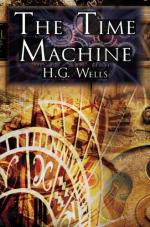
|
| Name: _________________________ | Period: ___________________ |
This test consists of 5 short answer questions and 1 (of 3) essay topics.
Short Answer Questions
1. Which character returns to the Time Traveler's laboratory the next day, after the Time Traveler returns home?
2. Why does the Time Traveler have trouble lighting matches in Chapter 10?
3. What does the narrator think he sees in Chapter 12?
4. Why does the Time Traveler keep the camphor he finds?
5. Faced with his loathing of the Morlocks, the Time Traveler feels like a what "in a cage"?
Essay Topics
Write an essay for ONE of the following topics:
Essay Topic 1
Wells imagines a future where humanity has evolved into two separate and symbiotic species. Discuss, in detail, the biological differences Wells predicted and how selection (that is, evolutionary process) led to these differences. Be sure to use specific examples from the novel that show the "devolution" Wells has predicted and how the Time Traveler imagines it happened. While Wells may have considered this evolution "devolution," what do you think? Is this long-term view of humanity necessarily as negative as Wells's character seems to think? Why or why not?
Essay Topic 2
The question of humanity, of what makes a person human, is at the forefront of this novel's play of ideas. Wells posits, perhaps, that there are certain characteristics that define the essence of humanity, which the Morlock and the Eloi have lost. Name and describe these characteristics, using specific examples. You may want to consider specifically his time in the museum, as well as the end of the novel and the epilogue, as well as his first few days with the Eloi.
Essay Topic 3
The issue of the preservation of cultural memory and transmission of history helps structure Wells's narrative. Consider the Time Traveler's experience at the Palace. In the year 802,700, what is preserved from the culture in which the Time Traveler was born? What do you think Wells wants the reader to take away from the Time Traveler's experience in this museum?
|
This section contains 372 words (approx. 2 pages at 300 words per page) |

|




